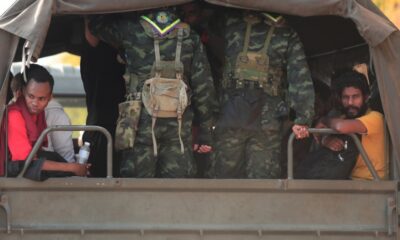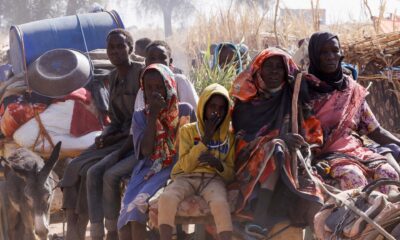Middle East
Netanyahu’s survival tactics tested amid Israel Shin Bet head’s accusations | Politics News

Israeli Prime Minister Benjamin Netanyahu has a knack for survival. The country’s longest serving leader – he has been in power for 18 years over three nonconsecutive periods – has seen off many rivals and outlasted several enemies.
The latest fight is with Ronen Bar, the head of Israel’s domestic intelligence agency, the Shin Bet.
Netanyahu fired Bar last month due to what he called a breakdown in trust, but the Supreme Court has suspended the dismissal, pending an investigation.
In the meantime, there have been protests against Netanyahu – the prime minister is used to those – and now an affidavit filed by Bar on Monday, in which he lobs several accusations against the Israeli leader.
They include demands from Netanyahu that Bar place his loyalty to him above that of the Supreme Court’s rulings if the two ever clash and that he spy on Netanyahu’s opponents. It all comes as the Shin Bet investigates financial ties between Netanyahu’s office and Qatar.
Scandal after scandal
Netanyahu has denied Bar’s claims, calling his affidavit a “false” one that would be “disproved in detail soon”.
The response follows the Netanyahu playbook when facing opposition – a denial of any accusations made against him, a shifting of the blame and pushing a problem to the future if possible.
The legal cases Netanyahu faces – he is on trial for corruption – are a case in point. The prime minister has been able to drag the court process out for years and most recently has used Israel’s war on Gaza to delay his court appearances.
“There is scandal fatigue in the Israeli public,” Israeli political analyst Nimrod Flaschenberg told Al Jazeera.
Flaschenberg added that Israeli society’s increased polarisation means another scandal will hardly shift where people stand on the divisive Netanyahu.
“People who are against Netanyahu and against the government see this as another evidence of the corruption, the deterioration of democratic space and the end of Israeli democracy,” he said. “And people from the pro-Netanyahu camp see this as Bar trying to generate a coup against Netanyahu and his right-wing government.”
This polarisation has been aided by the fact the Israeli political opposition is fractured. Opposition figure Benny Gantz was once the challenger to the throne but has been criticised for failing to take strong stances on complicated issues, and there is growing support for him to be replaced as the head of the National Unity political alliance.
“Many Israelis think [the current situation is] an emergency but they don’t really have the tools to change it, and there’s no powerful opposition in the parliament that can do anything about it,” said Mairav Zonszein, a senior analyst on Israel with the International Crisis Group.
Strong coalition
The war in Gaza itself is a testament to Netanyahu’s survival skills. Despite being blamed by many Israelis for failing to prevent the October 7, 2023, attacks against Israel, among the deadliest in the country’s history, and unable to free the remaining captives held in Gaza or fully defeat Hamas, Netanyahu remains in power.
That is even as the war grows increasingly unpopular in Israel with 100,000 reservists failing to respond to their call-ups, according to the Israeli-Palestinian +972 Magazine.
And yet Netanyahu is arguably in a stronger position politically than he was at the start of the war, expanding Israeli-occupied territory in Lebanon and Syria, all while seeing the administration of ally President Donald Trump take power in the United States.
Netanyahu’s governing coalition may have lost some figures over time, including former Defence Minister Yoav Gallant, but it has become more solidified by shifting further to the right.
“His coalition is very much solid and intact,” Zonszein said. “Throughout the last year and a half, he’s only stabilised his coalition further.”
Netanyahu has increasingly leaned on the ultra-Orthodox and far-right parties like those led by two of the most far-right ministers in his government – Itamar Ben-Gvir and Bezalel Smotrich. While analysts said a shift rightwards has upset many Israelis, there seems to be little chance of change at the moment.
“It would take a very radical step to actually remove Netanyahu from power,” Zonszein said.
“It’s like a grinding, deteriorating situation in which more allegations and evidence come to light,” Zonszein said, speaking of the scandals Netanyahu has faced. “But it doesn’t mean it’s going to change anything on the ground.”
Little hope
A sort of lethargy may have started to set in in some quarters of Israeli society as Netanyahu holds onto power.
His coalition has enough seats in parliament to continue, and its members have their own reasons for wanting to avoid it breaking up.
That means the only way Netanyahu is likely to be removed from power is through elections – the next of which does not need to happen until October 27, 2026.
In theory, the attorney general could determine Netanyahu is unfit to serve, but analysts said that would prove contentious and unlikely to happen. Failing that, the only way Netanyahu might be removed from power would be through elections.
A poll this month from Israel’s Channel 12 showed that the right-wing former Prime Minister Naftali Bennett’s new party would win a majority if elections were held today. But that alone is not enough to calm the worries of some people in Israel.
“Some Israelis are concerned that there won’t be a free and fair election next year,” Zonszein said.
Flaschenberg said he feared the police could be used by Netanyahu and his allies to suppress voting.
There are, however, some possible moves for the Israeli public to play. Flaschenberg said public strikes have been effective in the past. In mid-2023, a public strike prevented Netanyahu from firing Gallant although another attempt at a strike in late 2024 failed because of a lack of clear demands.
And the furore over the attempted firing of Bar is unlikely to change things. For the pressure to manifest into something tangible against Netanyahu, a number of factors would have to come to fruition.
“If this legal security situation with Ronen Bar and with the Shin Bet will intensify and at the same time the refusal wave that we are seeing or the wave of protests of people from the army against the war, this might shake things up and maybe change course,” Flaschenberg said.
“So I’m not entirely hopeless about what could develop in the next few months,” he said, before adding: “[But] I’m relatively hopeless.”
Middle East
Gaza is burning. UK NGOs must abandon failed diplomacy and fight back | Israel-Palestine conflict

Israel’s Defence Minister Israel Katz declared last week that “no humanitarian aid will enter Gaza”, effectively announcing his government’s intention to continue the collective punishment of the Palestinian enclave’s battered and besieged civilian population in blatant violation of international humanitarian law.
“Blocking this aid is one of the main pressure levers preventing Hamas from using it as a tool with the population,” he went on to say, “No one is currently planning to allow any humanitarian aid into Gaza, and there are no preparations to enable such aid.”
Many leading NGOs and international institutions, such as Amnesty and Human Rights Watch, have long identified Israel’s weaponisation of aid in Gaza as an act of genocide. In response to Katz’s most recent comments, they once again condemned the Israeli government’s genocidal policies and called on Israel’s Western allies to take action to enforce international law.
Such condemnations and calls to action, however, are clearly failing to produce the desired results. After 18 devastating months, Israel is still bombing, shooting at, displacing and starving Palestinians, while openly declaring its intention to continue with these crimes for the foreseeable future. And it is still doing so with the full political, military and diplomatic backing of its Western allies, including Britain.
This is why we believe it is time for British NGOs to change tack.
For the past 18 months, many of us working in the human rights and aid sectors in Britain made repeated requests to our government to do the bare minimum and enforce the basic tenets of international law on its ally, Israel. We campaigned, we lobbied, we engaged, and we explained. We showed the evidence, pointed to the law, and asked our leaders to do the right thing. Our pleas fell on deaf ears. We’ve been met with nothing but indifference.
To this day, Keir Starmer’s government continues to trade with and even sell arms to the Israeli government, despite being aware of the blatant crimes Israel commits day after day in Gaza and in the rest of the occupied Palestinian territories. It still considers Israel a key ally despite knowing that the International Court of Justice (ICJ) is reviewing an allegation of genocide directed at its “war” in Gaza and that there is an International Criminal Court (ICC) arrest warrant out for its prime minister, Benjamin Netanyahu, for various war crimes and crimes against humanity.
Just last week, Britain’s Foreign Secretary David Lammy held talks with Israel’s Foreign Minister Gideon Sa’ar – the top diplomat of a government under investigation for genocide – while he was on an unannounced visit to London. The Foreign Ministry confirmed that Lammy met Sa’ar to “discuss Gaza and other pressing Middle East issues”, during what it described as the Israeli minister’s “private visit to the UK”.
This is unacceptable. British government officials should not be having any public or private meetings with senior ministers from a country accused of the most heinous crimes recognised in international law. They must not be “discussing Gaza and other pressing Middle East issues” with Israeli leaders while Israel continues to bomb refugee tents, kill journalists and medics, and block the delivery of aid to a population under relentless siege.
No politician can claim ignorance of what is happening. Tens of thousands of Palestinians have been killed. Many more have been maimed, traumatised and displaced. Hospitals, clinics, refugee camps, schools, universities, residential neighbourhoods, water and food facilities have been destroyed. Hundreds of aid workers – both local and foreign, including Brits – have been targeted and killed, for the crime of trying to help Palestinians.
The British public at large is horrified by what Israel is doing in the occupied Palestinian territories, and they want it to stop. We have seen this in various opinion polls and on the streets in the form of enormous protests.
And yet, our government is intransigent. The meetings that so many aid and human rights organisations had with ministers and senior civil servants – difficult to get in the first place – have had no impact. Starmer’s government is impervious to all the normal lobbying and campaign tools we employ. It is refusing to hold Israel to account for its blatant violations of international law.
It is time for us to try a different strategy. We cannot continue to engage with the British government as if we are merely having a policy disagreement. This is not a routine case of our government refusing to pay sufficient attention to a conflict or crisis, due to different priorities or conflicting interests. This is not a disagreement we can overcome through engagement and debate. Britain’s leaders today are not only ignoring the most heinous war crimes being livestreamed on our screens on a daily basis, but also insisting on supporting the perpetrators of these crimes – diplomatically, politically and militarily – against warnings and desperate pleas from the human rights sector.
We believe the only way NGOs can actually make a difference in this space is by ending all engagement with the government on this issue. By continuing to talk to the government, we are not helping Palestinians on the ground or our colleagues working with a target on their backs in Gaza. We are merely providing the government with an opportunity to say it is doing something to help those stuck in Israel’s kill zone.
We must not participate in processes and engagements that will be used to whitewash Britain’s complicity in Israel’s crimes.
Rather than trying to talk to a government that has no intention of listening, we should support protests, boycotts and legal efforts to hold Israel’s leaders to account for their role in the genocide. The British government may not be willing to pay attention to our campaigns and reports, but they will eventually pay attention to the ever-growing protests on the streets and the legal decisions against their Israeli allies in British and international courts. At this point in time, continuing a dialogue with the government will only turn us into instruments of British foreign policy.
There is only one way forward. We must loudly name what’s happening in Gaza – a genocide. We should name the crime, underline our government’s complicity in it, and focus our efforts on elevating the voices of our Palestinian colleagues on the ground. Meetings with ministers and civil servants behind closed doors will not make a difference, but informing the public of what is actually happening in Gaza, with support from our government, just may.
We know that our actions cannot magically put an end to the genocide in occupied Palestine, but they can still make a difference. We can add to the pressure on those who have the power to stop the carnage, which is so needed. Additionally, stopping our fruitless engagements with the government will allow us to reorient our work, reconnect with the wider public from whom we should draw our legitimacy and strength, and focus our energy on actions that can make a real difference for people in need.
The actions we, as members of the aid and human rights sector in Britain, take now, do not only matter to those in Gaza. The way our government, our leading institutions and our society at large deal with the genocide in Gaza will set a precedent for how they will deal with crises and emergencies in the future – at home and abroad. It will determine whether our country will be a force that works to uphold human rights and international law, or one that tramples on them whenever convenient. Today, we must all fight for what is right, and show our government that indifference is not acceptable in the face of genocide, lest we ourselves become complicit. History will judge how we respond to this moment.
The views expressed in this article are the authors’ own and do not necessarily reflect Al Jazeera’s editorial stance.
Middle East
Child among at least 10 killed in Israeli attack on school shelter in Gaza | Gaza News

A child burns to death following the attack on school-turned-shelter in Gaza City.
At least 10 people have been killed in an Israeli attack that sparked a fire at a school sheltering displaced people in Gaza City, including one child who was burned to death in the blaze.
The Palestinian Civil Defence said its emergency workers recovered 10 bodies early on Wednesday morning after the attack on the school, where forcibly displaced people had taken shelter. A large number of people were also injured, it said in a post on the Telegram messaging platform.
“Children are being burned while they sleep in the tents of the displaced,” Al Jazeera correspondent Anas al-Sharif wrote on social media after the attack.
“There are no safe areas, and no survivors of this genocide. Gaza City and its northern areas have been subjected to heavy Israeli shelling and artillery fire for hours,” he said.
Video footage shared on social media after the attack on the school-turned-shelter showed flames engulfing tent structures and canvas covering melting onto the remains of burning chairs and what appeared to be a bed frame.
Several civilians burned to death after Israeli forces targeted displacement tents inside Yafa School, east of Gaza City. pic.twitter.com/ABNRWdFjSf
— Quds News Network (@QudsNen) April 23, 2025
The civil defence also issued an urgent appeal for assistance from the International Committee of the Red Cross to help rescue people trapped under the rubble following Israel’s bombing of two homes in Gaza City’s Tuffah neighbourhood.
“Trapped people are calling for help to rescue them from under the rubble of homes,” the civil defence said in a statement, adding that emergency workers were unable to reach the area because it was too dangerous, as the area is designated a “no-go” zone by Israeli forces.
Our colleagues at Al Jazeera Arabic and local Palestinian media also reported that a child was among two people killed on Wednesday morning in an Israeli attack on tent shelters in northern Gaza’s Jabalia refugee camp.
One person was also reported killed and several injured in an Israeli drone attack on tent shelters in the so-called al-Mawasi “safe zone”, south of Khan Younis in southern Gaza.
Intense Israeli artillery fire and air attacks were reported across the Strip in the early hours of the morning.
Middle East
The Take: US-Iran nuclear talks resume. What’s at stake now? | Nuclear Weapons News

Iran and the United States are holding indirect nuclear talks, mediated by Oman, with the next round set for Saturday. Both sides report progress, but major gaps remain. Iran seeks sanctions relief and civilian uranium enrichment, while the US insists on stricter limits. Could this be the moment the long-stalled negotiations finally produce a breakthrough?
In this episode:
Episode credits:
This episode was produced by Amy Walters, Khaled Soltan, and Tamara Khandaker with Sarí el-Khalili, Phillip Lanos, Spencer Cline, Mariana Navarrete, Kisaa Zehra, Remas Alhawari, Kingwell Ma, Marcos Bartolomé, Manuel Rapalo, and our guest host, Natasha Del Toro. It was edited by Noor Wazwaz.
Our sound designer is Alex Roldan. Our video editors are Hisham Abu Salah and Mohannad Al-Melhem. Alexandra Locke is The Take’s executive producer. Ney Alvarez is Al Jazeera’s head of audio.
Connect with us:
@AJEPodcasts on Instagram, X, Facebook, Threads and YouTube
-

 Europe1 day ago
Europe1 day agoSimone Biles, Mondo Duplantis win big at 25th Laureus World Sports Awards
-

 Sports1 day ago
Sports1 day agoShannon Sharpe: Pro Football Hall of Famer and podcast star sued for sexual assault and battery
-

 Middle East1 day ago
Middle East1 day agoIsraeli spy chief accuses Netanyahu of demanding illegal operations | Politics News
-

 Education2 days ago
Education2 days agoInvoluntary collection of defaulted student loans to resume, Education Department says
-

 Middle East2 days ago
Middle East2 days ago‘A cancer’: UN warns Asia-based cybercrime syndicates expanding worldwide | Cybercrime News
-

 Education2 days ago
Education2 days agoAs a nationwide push to ban cellphones in schools grows, Congress looks to get involved
-

 Europe2 days ago
Europe2 days agoCardinal Kevin Farrell: Meet the ‘camerlengo’ running the Vatican
-

 Middle East2 days ago
Middle East2 days agoMore than 30 killed in latest attack in Sudan’s Darfur region: Monitor | Sudan war News




